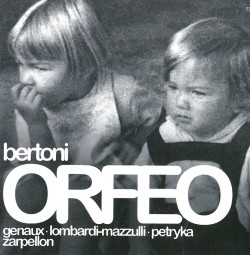 Ferdinando Bertoni – Orfeo
Ferdinando Bertoni – Orfeo
Genaux; Lombardi-Mazzulli; Petryka; Accademia di Santo Spirito de Ferrara; Ensemble Lorenzo da Ponte; Roberto Zarpellon
Fra Bernardo FB 1601729 (frabernardo.com)
Ferdinando Bertoni’s Orfeo ed Euridice was first performed in 1776, 14 years after Gluck’s opera on the same subject. The two operas use the same libretto (by Calzabigi) and, in both cases, the role of Orfeo was first sung by the castrato Gaetano Guadagno. Bertoni was clearly aware of the Gluck opera and the two works have a great deal in common: no more da capo arias and an increased role for the orchestra and for the chorus. No one is likely to prefer Bertoni’s work to that of Gluck: it lacks the aggressiveness of the Furies or the celestial calm of the Elysian Fields or the pathos of Orfeo’s lament when he loses Eurydice for the second time. The English 18th-century musicologist Charles Burney once wrote that Bertoni’s operas “would please and soothe by their grace and facility, but not disturb an audience by enthusiastic turbulence.” The comment is a little snarky and certainly very English but not altogether unfair.
Casting a singer for a role created by a castrato always involves problems. John Eliot Gardiner has both performed and recorded Gluck’s opera and has always used a countertenor in the main part. He argues that casting a female mezzo or alto constitutes a “deplorable” distortion. But we don’t really know what an 18th-century castrato sounded like and we have no guarantee that a modern countertenor comes closer than a female singer. In this recording the part of Orfeo is taken by the mezzo Vivica Genaux and she is splendid.
It is probably true that Bertoni “never had sufficient genius and fire to attain the sublime” (Burney again) and that he was not a major composer like Gluck. Still, there is plenty to enjoy in this recording. Recommended.



